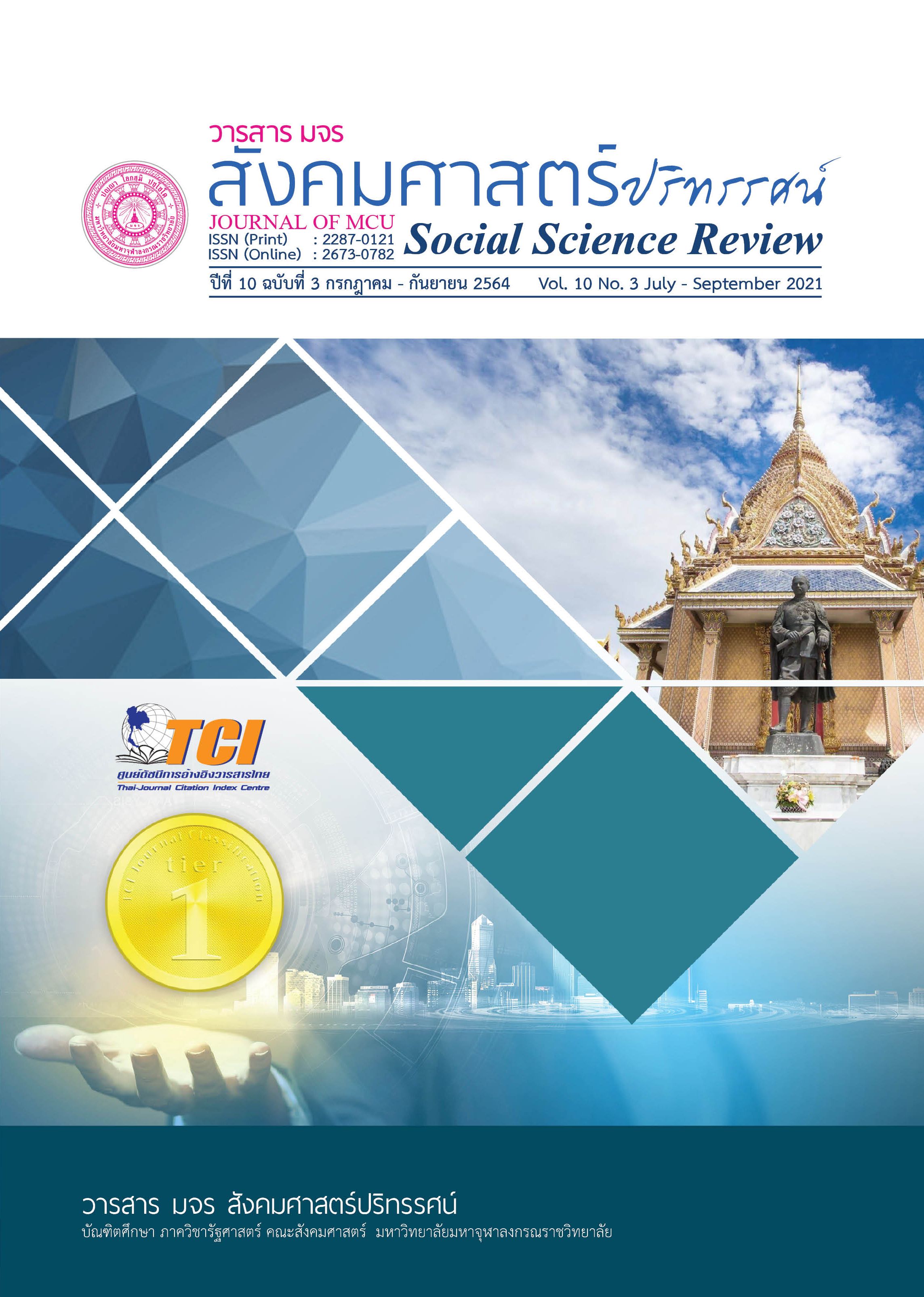การติดตามผลกระบวนการมีส่วนร่วมในการผลิตสื่อ เพื่อการเรียนรู้จริยธรรมวิชาชีพสื่อสารมวลชน
คำสำคัญ:
การติดตามผล, การมีส่วนร่วม, การผลิตสื่อ, จริยธรรมวิชาชีพสื่อสารมวลชนบทคัดย่อ
บทความวิจัยนี้มีวัตถุประสงค์เพื่อศึกษาปัจจัยที่ส่งผลต่อการตัดสินใจเชิงจริยธรรมสื่อสารมวลชนในการผลิตสื่อ ทั้งด้านพุทธพิสัย จิตพิสัย และทักษะพิสัยของนักศึกษา เริ่มจากปี พ.ศ.2559 ถึงปี พ.ศ. 2562 และเพื่อติดตามผลการเรียนรู้จากโครงการวิจัย เป็นการวิจัยแบบผสานวิธี ระหว่าง การวิจัยเชิงเอกสาร การวิจัยเชิงคุณภาพและการวิจัยเชิงปฏิบัติการแบบมีส่วนร่วม ผู้ให้ข้อมูลสำคัญเป็นนักศึกษาและอาจารย์ซึ่งเป็นอาสาสมัครจากมหาวิทยาลัยราชภัฏพระนคร จำนวน 35 คน เครื่องมือที่ใช้ในการเก็บรวบรวมข้อมูล ได้แก่ การสัมภาษณ์ การสนทนากลุ่ม การสังเกต และผลงานสื่อของนักศึกษา การวิเคราะห์ข้อมูลด้วยการพรรณนาความ
ผลการวิจัยพบว่า 1. เมื่อมีการติดตามกระบวนการเรียนรู้ผ่านการมีส่วนร่วมในการผลิตสื่อผ่านไป 4 ปี นักศึกษามีการซึมซับจริยธรรมสื่อสารมวลชนจากปัจจัยต่าง ๆ ได้แก่ การวิจัยการเรียนรู้จริยธรรมสื่อสารมวลชนผ่านการมีส่วนร่วมในผลิตสื่อละครโทรทัศน์ในปี 2559 รายวิชาที่เรียนในหลักสูตร และการซึมซับจากการนำเสนอเนื้อหาที่ปรากฏในสื่อมวลชนในชีวิตประจำวัน 2. หลังจากนักศึกษาผ่านกระบวนการเรียนรู้อย่างมีส่วนร่วมในการผลิตสื่อ นักศึกษาสามารถตัดสินใจเชิงจริยธรรมวิชาชีพในการผลิตสื่อได้อย่างเหมาะสม นั่นคือ เกิดความเปลี่ยนแปลงลักษณะการเรียนรู้ในตัวนักศึกษา 3 ด้าน ได้แก่ ด้านพุทธิพิสัย คือนักศึกษา เกิดความรู้ ความเข้าใจ ความคิดอย่างเป็นระบบ ด้านจิตพิสัย คือนักศึกษา ตระหนัก เคารพ ใส่ใจ จริยธรรมวิชาชีพสื่อสารมวลชน และ ด้านทักษะพิสัย คือนักศึกษา ทำได้ ทำเป็น ทำถูกต้อง
เอกสารอ้างอิง
กาญจนา แก้วเทพ. (2548). ก้าวต่อไปของการสื่อสารเพื่อการพัฒนาชุมชน. กรุงเทพฯ: สำนักงานกองทุนสนับสนุนการวิจัย.
________. (2556). คุณลักษณะ & วิธีวิทยางานวิจัยเพื่อท้องถิ่น (พิมพ์ครั้งที่ 3). กรุงเทพฯ: สำนักงานกองทุนสนับสนุนการวิจัย.
ปาริชาต สถาปิตานนท์และคณะ. (2549). การสื่อสารแบบมีส่วนร่วมและการพัฒนาชุมชน: จากแนวคิดสู่ปฏิบัติการวิจัยในสังคมไทย. กรุงเทพฯ: สำนักงานกองทุนสนับสนุนการวิจัย.
ทิศนา แขมมณี. (2552). ศาสตร์การสอน (พิมพ์ครั้งที่ 5). กรุงเทพฯ: สำนักพิมพ์แห่งจุฬาลงกรณ์มหาวิทยาลัย.
ศิริวรรณ อนันต์โท. (2558). จริยธรรมในวิชาชีพสื่อมวลชน: การศึกษาในประเทศไทยและในภูมิภาคอาเซียน. วารสารอิศราปริทัศน์, 4(6), 7-25.
โสรยา งามสนิท. (2560). การมีส่วนร่วมในการผลิตสื่อละครโทรทัศน์เพื่อการเรียนรู้จริยธรรมสื่อสารมวลชนอย่างยั่งยืน (รายงานการวิจัย). กรุงเทพฯ: มหาวิทยาลัยราชภัฏพระนคร.
สำนักงานคณะกรรมการพัฒนาการเศรษฐกิจและสังคมแห่งชาติ. (2549). แผนพัฒนาเศรษฐกิจและสังคมแห่งชาติ ฉบับที่ 10. สืบค้น 15 พฤษภาคม 2563, จาก https://www.nesdc.go.th/download/article/article_20160323112418.pdf
________. (2554). แผนพัฒนาเศรษฐกิจและสังคมแห่งชาติ ฉบับที่ 11. สืบค้น 15 พฤษภาคม 2563, จาก https://www.nesdc.go.th/download/article/article_20160323112431.pdf
Stephenson, W. (1988). The Play Theory of Mass Communication. Transaction, Inc.
Singhal, A & Rogers, E. (1999). Entertainment-Education: A Communication Strategy for Social Change. Lawrence Erlbaum Associates.
ดาวน์โหลด
เผยแพร่แล้ว
รูปแบบการอ้างอิง
ฉบับ
ประเภทบทความ
สัญญาอนุญาต
ลิขสิทธิ์ (c) 2021 วารสาร มจร สังคมศาสตร์ปริทรรศน์

อนุญาตภายใต้เงื่อนไข Creative Commons Attribution-NonCommercial-NoDerivatives 4.0 International License.
เพื่อให้เป็นไปตามกฎหมายลิขสิทธิ์ ผู้นิพนธ์ทุกท่านต้องลงลายมือชื่อในแบบฟอร์มใบมอบลิขสิทธิ์บทความให้แก่วารสารฯ พร้อมกับบทความต้นฉบับที่ได้แก้ไขครั้งสุดท้าย นอกจากนี้ ผู้นิพนธ์ทุกท่านต้องยืนยันว่าบทความต้นฉบับที่ส่งมาตีพิมพ์นั้น ได้ส่งมาตีพิมพ์เฉพาะในวารสาร มจร สังคมศาสตร์ปริทรรศน์ เพียงแห่งเดียวเท่านั้น หากมีการใช้ภาพหรือตารางหรือเนื้อหาอื่นๆ ของผู้นิพนธ์อื่นที่ปรากฏในสิ่งตีพิมพ์อื่นมาแล้ว ผู้นิพนธ์ต้องขออนุญาตเจ้าของลิขสิทธิ์ก่อน พร้อมทั้งแสดงหนังสือที่ได้รับการยินยอมต่อบรรณาธิการ ก่อนที่บทความจะได้รับการตีพิมพ์ หากไม่เป็นไปตามข้อกำหนดเบื้องต้น ทางวารสารจะถอดบทความของท่านออกโดยไม่มีข้อยกเว้นใดๆ ทั้งสิ้น





